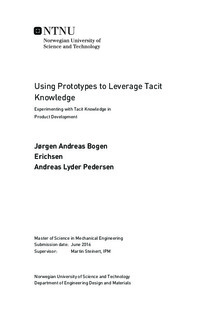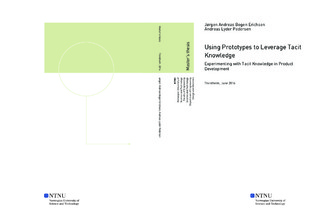| dc.description.abstract | With increasing pressure on knowledge creating companies to innovate faster and better, there is an apparent need for leveraging knowledge transfer both within the organization and within groups of individuals. While the transfer of explicit information, facts, drawings and data are widely covered by current engineering design research, few efforts highlight the importance of leveraging the tacit knowledge within product development.
This thesis aims at enabling this tacit knowledge transfer; the learnings, insights and experiences, through the use of prototypes in the early stages of development. Aimed at both practitioners and academics, this thesis presents three academic papers, containing a theoretical framework for exploring said knowledge transfer. Additionally, a thorough elaboration of select theoretical topics is presented, meant to supplement the content of academic papers.
To further explore the use of prototypes for knowledge transfer in product development, a two-part controlled research experiment has been designed and run using 33 participants being either professional practitioners or mechanical engineering graduate students. Here, we test the impact of (both high and low) prototype affordance on three hypotheses; the Problem and Concept Understanding Hypothesis , the Design Fixation Hypothesis and the Learning Activity Hypothesis . In our results, we find some statistical support for stating that prototype affordance has a significant impact on concept evaluation (and therefore understanding). However, we also find that there is not enough evidence to state that prototype affordance has a significant impact on either problem understanding, design fixation or quality of design. Lastly, insights containing interpretations, limitations and implications are presented, stating that there is a need for further exploration of knowledge transfer through prototypes. | |

